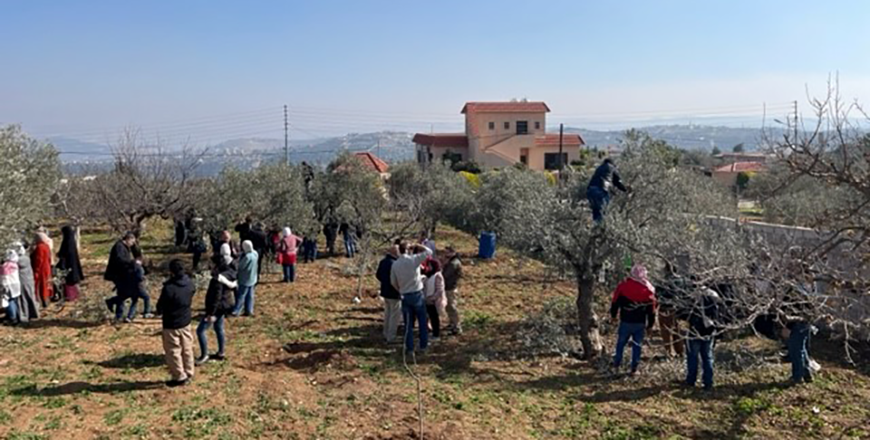By JT – Feb 10,2023

Participants during a training session for olive growers, industry workers and government technicians on good pruning and irrigation techniques (Photo courtesy of FAO)
AMMAN — Around 190 olive growers, industry workers and government technicians from Jordan have benefitted from training sessions on improving their crops with efficient irrigation and effective pruning, according to the UN Food and Agriculture Organisation (FAO).
The technical training on good pruning and irrigation techniques targeted technicians and extension service agents of the Ministry of Agriculture. Practical workshops for farmers and support services took place in Karak, Salt and Irbid — the country’s most important olive growing regions, said a FAO statement.
The sessions were geared at boosting plant health and yields, cutting production costs, promoting efficient harvesting methods and reducing water usage
“Maximising harvests for farmers and promoting good irrigation techniques remains very important from both economic and environmental viewpoints,” said Baker Balawna, assistant secretary general for extension services at the Agriculture Ministry. “Technical and hands-on training will help agricultural engineers support farmers to increase olive tree productivity, reduce costs, maximise water availability and enhance efficiency,” Balawna added.
The trainings are the latest in a “suite of initiatives” to champion Jordan’s olive industry from the European Bank for Reconstruction and Development (EBRD) and the FAO — aimed at facilitating the country’s olive businesses and becoming more productive and sustainable.
The European Union is providing support through the Trade and Competitiveness Programme, which helps small and medium enterprises (SMEs).
“More than 100 small- and medium-sized olive oil enterprises in Jordan — including farmers, millers and traders — are benefitting from our ongoing support, which aims to strengthen local economies and boost Jordan’s olive industry internationally,” said Iride Ceccacci, head of Agribusiness Advisory at the EBRD.
Sustaining Jordan’s vital olives
Jordan has some of the world’s most ancient habitats for olive trees and olives are vital to Jordan’s economy, environment and culture.
Olive trees cover 30 per cent of cultivated area and make up 75 per cent of fruit trees, providing employment for around 80,000 households.
Yet, olive production is becoming more challenging due to high production and running costs, erratic climate conditions, growing international competition and increasing water scarcity, according to the statement.
“The pressure is on for Jordan’s olive growers to build more robust businesses, improve the quality of olive tree products for local and international markets, increase resilience of the trees and reduce the environmental impact through more efficient water usage,” said Areej Jafari, FAO’s food system institutions and policy expert.
“Our goal is to support policy makers as well as private sector olive oil producers and processors to increase productivity, contain production costs and build sector sustainability,” Jafari noted.
According to the FAO, irrigation is a major concern for farmers, policymakers and technicians in Jordan’s olive sector.
A technical session explored innovative irrigation techniques for Jordan’s arid environment, including “controlled deficit irrigation” — a water management method, which carefully limits the tree’s access to water during the growing season.
Olive trees are naturally well adapted to fluctuations in water availability. Scientific studies and experiences from Italian olive growers indicate that applying deficit irrigation doesn’t impact olive tree growth or yield — yet it can significantly enhance water saving and cut costs.
“Innovative irrigation techniques and pruning skills mean we will be able to produce more olives with less water,” said agronomic engineer from the ministry, Halima Al Rahamneh, head of section for extension services, Salt. “This means we can manage the olives in a controlled way and help make our businesses more efficient – even with unpredictable rainfall and water deficit,” Rahamneh added.
‘Pruning tips’ from Italy to Jordan
Jordanian olive growers and industry workers took part in practical pruning workshops and learned from the experience of Italian producers.
“Proper pruning increases fruit size and facilitates detachment, develops oil yield, reduces fungal pathogens, and increases the speed of harvesting while reducing costs,” said FAO’s olive oil production and quality expert, Giovanni Martellini.
“Improving the efficiency and productivity of the sector will enable growers to develop the domestic market for olive oil, and improve the visibility of Jordan’s good quality olive oil on international markets,” continued Martellini.
In practical sessions among the olive groves, participants learned more about growing conditions and production practices, and tried out techniques to shape olive trees.
“Pruning olive trees in the right way to restructure the tree’s shape will reduce the foliage density and humidity, opening more of the tree up to sunshine,” said Ali Awwad Abu Rumman, a farmer from Salt who took part in the training. “These techniques will improve fruiting and reduce water consumption,” he added.
Farmers learned how various pruning methods could be adapted according to olive varieties, collection methods, water availability, environmental conditions and farming type.
“This is a highly useful training and with this knowledge I plan to redo my pruning,” said Maysoon Al Baq’een, a farmer from Karak. “I am looking forward to seeing our olive trees with less foliage and better adapted to the arid conditions in the south of Jordan,” Baq’een added.
Next steps in the FAO/EBRD support to Jordan’s olive sector will be the launch of a value chain study showcasing opportunities to advance the sector through investment and innovation, slated for publication in early 2023, according to the statement.
